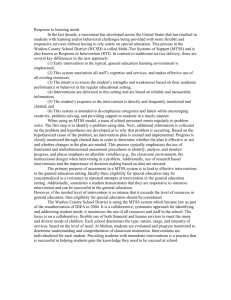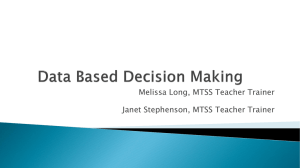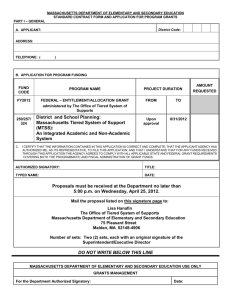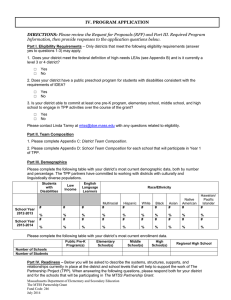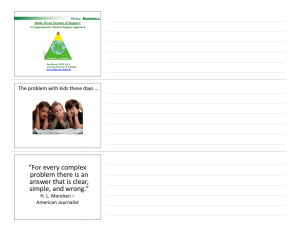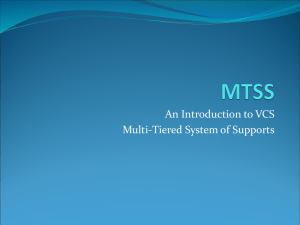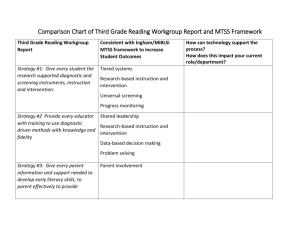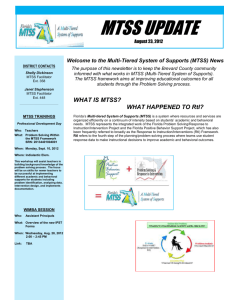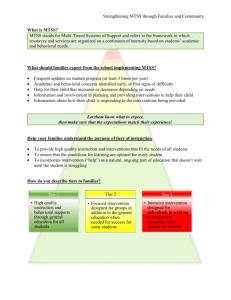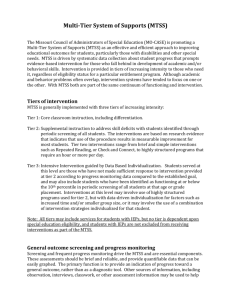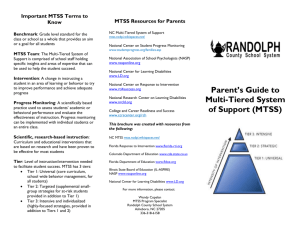CALA Statement to CPS Administration and School Committee
advertisement
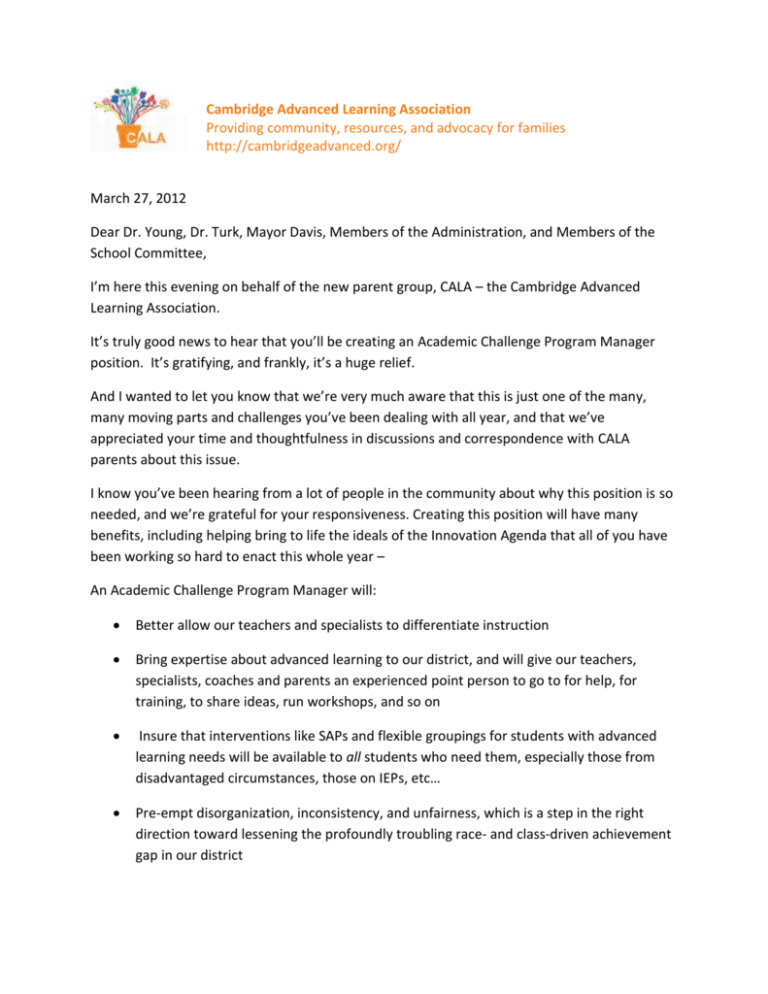
Cambridge Advanced Learning Association Providing community, resources, and advocacy for families http://cambridgeadvanced.org/ March 27, 2012 Dear Dr. Young, Dr. Turk, Mayor Davis, Members of the Administration, and Members of the School Committee, I’m here this evening on behalf of the new parent group, CALA – the Cambridge Advanced Learning Association. It’s truly good news to hear that you’ll be creating an Academic Challenge Program Manager position. It’s gratifying, and frankly, it’s a huge relief. And I wanted to let you know that we’re very much aware that this is just one of the many, many moving parts and challenges you’ve been dealing with all year, and that we’ve appreciated your time and thoughtfulness in discussions and correspondence with CALA parents about this issue. I know you’ve been hearing from a lot of people in the community about why this position is so needed, and we’re grateful for your responsiveness. Creating this position will have many benefits, including helping bring to life the ideals of the Innovation Agenda that all of you have been working so hard to enact this whole year – An Academic Challenge Program Manager will: Better allow our teachers and specialists to differentiate instruction Bring expertise about advanced learning to our district, and will give our teachers, specialists, coaches and parents an experienced point person to go to for help, for training, to share ideas, run workshops, and so on Insure that interventions like SAPs and flexible groupings for students with advanced learning needs will be available to all students who need them, especially those from disadvantaged circumstances, those on IEPs, etc… Pre-empt disorganization, inconsistency, and unfairness, which is a step in the right direction toward lessening the profoundly troubling race- and class-driven achievement gap in our district Contribute to our district being able to deliver an excellent education to every student in a socially just way; to respect and value each student as a learner; to help our kids become students who love learning; and who learn how to learn. This Academic Challenge Program Manager position also ties into the Massachusetts Tiered System of Support – MTSS, which has evolved over the last five years, out of Response to Intervention and related programs. There’s a new MTSS section in the Special Education part of the DESE website. It just went online in October, and was presented at the DESE’s “Curriculum, Instruction, and Assessment Summit” in November. The first chapter says: … the Massachusetts Tiered System of Support (MTSS), provides a framework for school improvement that focuses on system level change across the classroom, school, and district to meet the academic and non-academic needs of all students, including students with disabilities, English language learners, and students who are academically advanced. It guides both the provision of high-quality core educational experiences in a safe and supportive learning environment for all students and academic and/or nonacademic targeted interventions/supports for students who experience difficulties and for students who have already demonstrated mastery of the concept and skills being taught. http://www.doe.mass.edu/mtss/blueprint/ [an excerpt is attached below] MTSS is exciting, because it reflects an expanded way of thinking about any student who needs help. MTSS says: here’s a student, any student, and here’s the curriculum – how are they interacting? Is there a problem? Is the curriculum too hard? Is it too easy? Is it culturally accessible? If there’s a mismatch, is there a related social or behavioral issues? Then you go from there with interventions and responses. This is exciting because it’s a way of thinking about all students and how best to meet their needs. So, on behalf of the CALA community, thank you for taking this significant step. We know this is just a beginning, and we stand ready to work with you ongoing, to insure that all students’ needs in Cambridge are met in a socially just and equitable way. In fact, one of our parents, who works at Tufts with freshman math students from disadvantaged backgrounds, has an excellent, viable idea for a math grant proposal for the Upper Schools, and we have a STEM contact at Google who’s ready to work with us on this. So we’re excited to contact you about that very soon. Thank you! - Freedom Baird, for the CALA community CPS parent, CALA coordinator http://cambridgeadvanced.org/ freedom.baird@gmail.com c: 617-529-6744 State Government · State Services Family & Community Special Communities Special Education The Massachusetts Tiered System of Support (MTSS) Massachusetts has developed a blueprint outlining a single system of supports that is responsive to the academic and non-academic needs of all students. This blueprint, the Massachusetts Tiered System of Support (MTSS), provides a framework for school improvement that focuses on system level change across the classroom, school, and district to meet the academic and non-academic needs of all students, including students with disabilities, English language learners, and students who are academically advanced. It guides both the provision of high-quality core educational experiences in a safe and supportive learning environment for all students and academic and/or non-academic targeted interventions/supports for students who experience difficulties and for students who have already demonstrated mastery of the concept and skills being taught. Schools and districts are encouraged to work toward an integrated approach to support students' academic and social-emotional competencies. All students receive academic instruction and behavioral supports that include differentiation and extension activities and are guided by the three Universal Design for Learning principles (multiple means of representation, multiple means of action and expressions, and multiple means of engagement). MTSS Application to Students with IEP's Relevant information from students' Individualized Education Programs (IEPs) is incorporated into the design and implementation of instruction and assessments to enable students eligible for special education services to access fully the system of tiered instruction and non-academic supports. Determining eligibility for Specific Learning Disabilities Policies and procedures must be in place to comply with Special Education Regulations regarding the use of tiered instruction to determine eligibility for Specific Learning Disabilities. View the forms and technical assistance documents that are to be used when finding a student eligible for special education with a Specific Learning Disability (SLD). last updated: October 11, 2011
